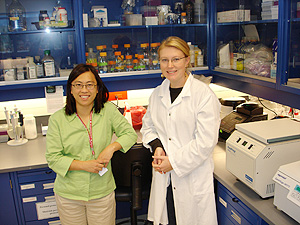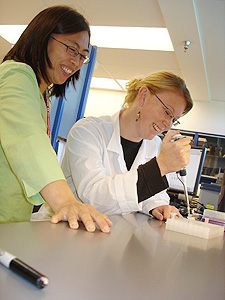 |
|
| Executive Council Office |
|
|
|
|
“It wasn’t until university that I developed an interest in molecular biology,” said Helen who began as a Psychology Major. “After taking a course in Physiological Psychology, I became curious about the molecular biology of behaviours.” A summer job at the University of Toronto working under Professor Joe Connolly confirmed her decision to pursue research. Helen remembers being one of few women in some of her graduate classes. “There were fewer women compared to my undergrad class, perhaps only 30 per cent,” said Helen. “In my current job, there are only three women Research Scientists including myself.” “I think what happens in this career is that you have a lot of uncertainty,” said Helen. “There’s preconceived perceptions of things. You also have to be prepared to move around. Combining that with having a family can make it difficult for women to enter into this profession.” Helen now works in Fredericton as a Potato Genomics Research Scientist at the Potato Research Centre with Agriculture & Agri-Food Canada. “My key role is to find solutions to issues in agriculture,” said Helen who works to improve potato processing quality and make potato production more environmentally friendly. “I research ways to improve potatoes through studying their genes,” said Helen. “The biggest challenge in my job is securing funding to do the research,” said Helen. “These days it is important for scientists to develop collaborative partnerships.” Another challenge she came upon was when she returned from her maternity leave while finishing graduate studies. “I felt like I had to regain respect from my colleagues,” said Helen. “I felt that I was not treated as seriously as a researcher because I had taken time off to have a child.” Helen adds that her career may have been shortened because she had taken time off for maternity leave whereas a male colleague would have had the opportunity to progress further along in his career. Despite this, Helen expressed her excitement for her career adding that although it hasn’t always been easy, there have been a lot of rewards.
Youth interested in pursuing the science profession should be aware that it can be competitive. Helen advises students should know how to establish themselves in order to maintain a level of competition in the international community. “You have to have a really strong interest and strong curiosity for the subject,” said Helen. “You should have a strong passion for it too so that when you do encounter struggles, you can overcome them.”
|
Executive Council Office Email | Contacts | Disclaimer | Privacy Statement |

